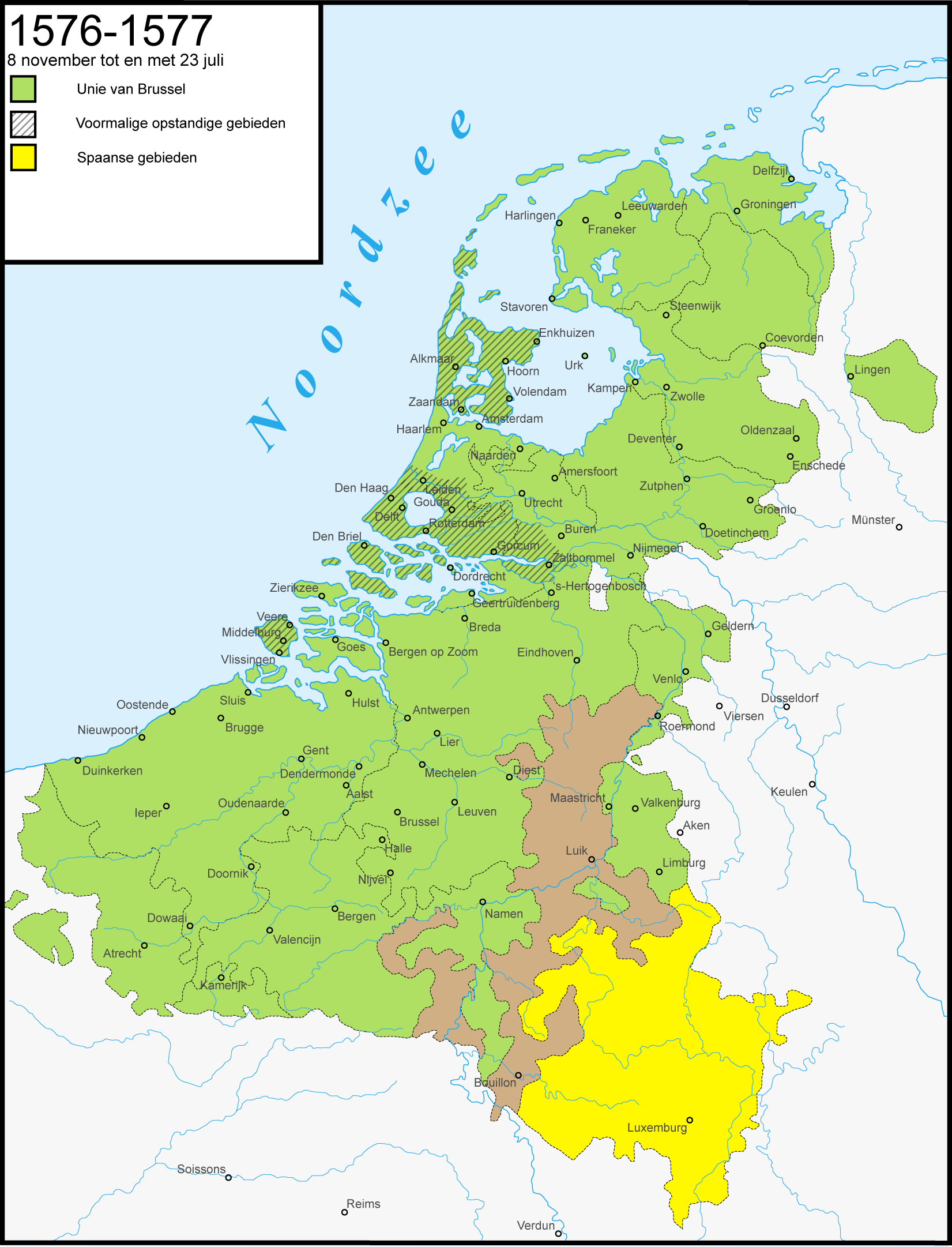Union of Brussels on:
[Wikipedia]
[Google]
[Amazon]
 There were two Unions of Brussels, both formed in the end of the 1570s, in the opening stages of the
There were two Unions of Brussels, both formed in the end of the 1570s, in the opening stages of the
 There were two Unions of Brussels, both formed in the end of the 1570s, in the opening stages of the
There were two Unions of Brussels, both formed in the end of the 1570s, in the opening stages of the Eighty Years' War
The Eighty Years' War or Dutch Revolt ( nl, Nederlandse Opstand) ( c.1566/1568–1648) was an armed conflict in the Habsburg Netherlands between disparate groups of rebels and the Spanish government. The causes of the war included the Refo ...
, the war of secession from Spanish control, which lasted from 1568 to 1648. Brussels was at that time the capital of the Spanish Netherlands.
First Union of Brussels
The northern counties of Holland and Zeeland rebelled in 1572, when Calvinists took over control of most of the cities. The Spanish army tried to reconquer them but failed during the Siege of Leiden in 1574. In 1575 Philip II had to declare bankruptcy. As a result, the Spanish soldiers did not receive any payment, and they mutinied, pillaging the countryside of Brabant and Flanders and the city ofAntwerp
Antwerp (; nl, Antwerpen ; french: Anvers ; es, Amberes) is the largest city in Belgium by area at and the capital of Antwerp Province in the Flemish Region. With a population of 520,504,
, where 10,000 inhabitants in a city with 100,000 people were killed by the Spanish soldiers, who tried to kill all the local Protestants.
This event discredited the Spanish army enormously. The Estates-General of the Netherlands, sitting in Brussels, wanted to end the war in 1577. However, some of the fervently Roman Catholic provincial Estates did not want to invite the Calvinists of Holland and Zeeland to join. The Estates-General, without Holland and Zeeland, founded the first Union of Brussels. King Philip II of Spain
Philip II) in Spain, while in Portugal and his Italian kingdoms he ruled as Philip I ( pt, Filipe I). (21 May 152713 September 1598), also known as Philip the Prudent ( es, Felipe el Prudente), was King of Spain from 1556, King of Portugal from ...
agreed with this.
Second Union of Brussels
The leader of the resistance, William of Orange, went to Brussels in 1577 to try to convince the General Estates to accept the Calvinist provincial Estates of Holland and Zeeland. The population of Brussels celebrated him as a hero, and it was with his urging that the General Estates accepted the two counties. Turmoil broke out in the Netherlands when the news spread throughout the realm. Calvinists took over the cities in Flanders and in other provinces of the Netherlands, but the estates of the eastern provinces did not accept this. The French-speaking provinces in the south started the pro-SpanishUnion of Arras
The Union of Arras ( Dutch: ''Unie van Atrecht'', French: ''Union d'Arras'', Spanish: ''Unión de Arrás'') was an alliance between the County of Artois, the County of Hainaut and the city of Douai in the Habsburg Netherlands in early 1579 dur ...
in 1579, when the French-speaking Protestants were driven out. The Stadtholder
In the Low Countries, ''stadtholder'' ( nl, stadhouder ) was an office of steward, designated a medieval official and then a national leader. The ''stadtholder'' was the replacement of the duke or count of a province during the Burgundian and H ...
of Groningen
Groningen (; gos, Grunn or ) is the capital city and main municipality of Groningen province in the Netherlands. The ''capital of the north'', Groningen is the largest place as well as the economic and cultural centre of the northern part of t ...
and Drenthe
Drenthe () is a province of the Netherlands located in the northeastern part of the country. It is bordered by Overijssel to the south, Friesland to the west, Groningen to the north, and the German state of Lower Saxony to the east. As of Nov ...
supported the king, and the city of Amsterdam did as well. The Calvinists had taken over most of the Netherlands and they created the Calvinist Union of Utrecht the same year. The Union of Brussels came to an end. Most of Brabant including the city of Brussels were neutral. The General Estates, which were dominated by Calvinists, fled from the Spanish army to Antwerp.
References
{{DEFAULTSORT:Union Of Brussels Eighty Years' War (1566–1609) History of the Low Countries